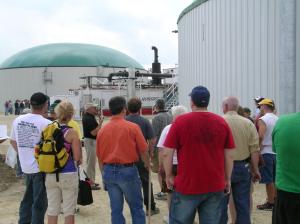Wednesday, June 30, 2010
From an article by Ryan Whisner in the Jefferson Daily Union:JEFFERSON - A proposal to build the second-largest solar-generation farm in the United States was presented to City of Jefferson officials Wednesday night.
Green States Energy Inc. of Deerfield Beach, Fla., unveiled plans to build a solar energy farm on 100 acres of the city's north industrial park that would generate approximately 20 megawatts of electricity.
Jefferson Sun One would have approximately 100,000 individual solar panel modules on the 100-acre parcel. The site - just north of the former Brigg & Stratton plant - would generate approximately 3.5 million kilowatt hours per year, equivalent to generating sufficient electricity for about 3,500 homes. An interconnectivity agreement with Jefferson Utilities and WPPI is intended.
"This is a big deal if it can be brought to fruition and can be built," said David Jenkins of the Wisconsin Office of Energy Independence.
Currently, he noted, Wisconsin has approximately 6.5 megawatts of installed solar capacity. Only two cities in the state are labeled by the U.S. Department of Energy as solar cities.
"Overnight, if this project were built, the City of Jefferson would have three times as much solar energy as there is in the entire state," Jenkins said. "As far as I'm concerned, if you had 20 megawatts of power here, you would be a solar city."
Approximately five to six weeks ago, Jefferson city officials were approached by representatives from Green States Energy about locating the solar energy farm in Jefferson. Green States representatives presented its proposal Wednesday to a joint session of the Jefferson Common Council, Jefferson Plan Commission and Jefferson Redevelopment Authority.
"It is an opportunity for us to not only provide a lot of good jobs in the construction phase and also the operational stage, but it is also an opportunity for the City of Jefferson to create an identity of being a nationwide leader in renewable energy," Mayor Dale Oppermann said. "We have the task, the challenge and the opportunity to reinvent the economy of Jefferson and the surrounding area."
He said Green States Inc. is offering the city the chance to get involved with state-of-the-art technology and create an identity for the city as being clean and green.
Green States Energy Inc. chief executive officer Jeffrey Lord described the company as a group of people who have come together under a common principle.
"The planet and the people on it will be better off if we can start using less fossil fuels to get the energy we need," Lord said, citing the company's mission.





